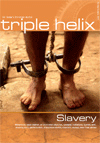On 25 March 1807, two hundred years ago, the British Parliament finally voted to make slave trading illegal throughout the Empire. The film Amazing Grace graphically recounts how a disparate group of campaigners, led by William Wilberforce, caused an entire nation to confront its guilt and to act. The title is derived from the famous hymn written by John Newton, the repentant slave trader, who knew Wilberforce and who features in the drama. Wilberforce's thirty year battle in the face of corruption, apathy and treachery almost led to his own death through sickness and despair. But, whilst others failed to stay the course, and motivated by his strong Christian faith, through relentless perseverance he changed the course of history.
In the late 18th century when Wilberforce began his fight, most people accepted slavery as a fundamental part of a functioning economy. No civilisation had ever lived without slaves, and at the time Parliament was institutionally (and constitutionally) corrupt, and unaccountable. Ordinary citizens had no vote.
The campaigners needed first to win over the minds and hearts of the people and then work through parliament. They employed leaflets, petitions, lapel badges and boycotts to mobilise public support and then used parliamentary procedure to their advantage. The reforms they brought were just some of those won by the Clapham Sect, evangelicals with a passion for justice, who built on the 18th century Christian revival under Wesley and Whitefield.
Slavery is the theme of this edition of Triple Helix. David Alton (6,7) applies the challenge of Wilberforce to some of the battles we fight today, from abortion to destructive embryo research. Nigel Pocock (16) gives us insight into the less well known Christian abolitionist physician, Thomas Winterbottom. Janet Goodall (5) asks who will stand up today against child slavery. Other articles address subtler forms of human exploitation – dissociative identity disorders after abuse and trauma (14,15), and the plight of junior doctors in the MMC debacle (12,13). After being required to 'make bricks without straw'[1] some juniors now face being left on the unemployment scrapheap. A hard-hitting article on Christian perfectionism (10,11) raises the question of whether some enslavement is of our making.
The freeing of slaves is a dominant biblical theme. Redemption, after all, is a term derived from the slave market. And redemption is at the very heart of God. Just as God sent Moses to deliver the Israelites from 400 years of slavery in Egypt, so he sent Jesus Christ to deliver people from bondage to the power, consequences and penalty of sin. God's intervention to save his people from persecution, oppression and despair is as much part of Revelation as it is of Exodus.
The prophet Isaiah decried the shallow pietism of his day - empty prayers, assemblies, fasting, festivals and feasts - to remind God's people that true religion was about seeking justice, freeing and encouraging the oppressed, defending the fatherless and the widow, and turning from sin.[2,3] Part of Jesus' Nazareth manifesto was 'to release the oppressed'[4] and part of following in his footsteps today must be that as Christian doctors we are called to be active in countering slavery in all its modern forms, from the sweat shops of Asia to 'human trafficking' and the bondage brought by false belief and self-destructive behaviour.
Two hundred years after Wilberforce, there are still millions living in slavery. People trafficked as part of the sex trade are living in ordinary suburbs across London. And in our surgeries and hospital wards we see every day the results of a different kind of bondage and enslavement through alcohol and drug addiction, gluttony, pornography, legalism, sexual immorality, materialism and other substitutes for God.
The story of Moses, the Exodus of the 'Children of Israel' from Egypt and the idea of a God who responded to the desperate cries of his people and saved them from their oppressors, resonated deeply with enslaved Negroes on the plantations of the West Indies and the United States. And it was there they crafted their impromptu field songs into the intricate, multi-part harmonies of struggle and overcoming, faith, forbearance and hope that have come to be known as 'Negro Spirituals'.
When, perhaps in the midst of rugby world cup fervour, you next hear a rendition of 'Swing Low Sweet Chariot', do remember that it was originally written by people who, whilst longing for release from their slavery, also recognised that man's greatest need was to be rescued by God. And whatever challenges you are facing, professionally or personally, never forget that God, who through Jesus Christ conquered Satan, the flesh and the world to save you,[5] holds you firmly in his grip, [6] and will never let you go.[7] Let's enjoy that freedom and bring it to others.
































